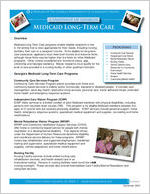A Progam Of The Georgia Department Of Community Health
A SNAPSHOT OF GEORGIA
Medicaid Long-Term Care
Overview
Medicaid Long-Term Care programs enable eligible recipients to live
in the setting that is most appropriate for their needs, including nursing
PROGRAMS
facilities, their own or a caregiver's home. To be eligible for long-term care assistance, applicants must meet both income and resource limits, although these limits may be higher than the limits for other Medicaid programs. Other criteria considered are: functional status, age, citizenship and Georgia residency. Waiver recipients must qualify for the level of care provided in a nursing facility or other qualified institution.
Community Care Services Independent Care Waiver Mental Retardation Waiver Nursing Facility Service Options Using Resources in a Community
Environment
Georgia's Medicaid Long-Term Care Programs
Home Health Services
Hospice
Community Care Services Program
Community Mental Health
Community Care Services Program waiver provides both home and
community-based services to elderly and/or functionally- impaired or disabled people. It includes care
management, adult day health, alternative living services, personal care, home delivered meals, extended
home health and emergency response systems.
Independent Care Waiver Program (ICWP) ICWP offers services to a limited number of adult Medicaid members with physical disabilities, including persons with traumatic brain injuries (TBI). This program is for eligible Medicaid members between the ages of 21 and 64 who are severely physically disabled. ICWP services include personal support, home health, emergency response systems, specialized medical equipment and supplies, counseling and home modifications.
Mental Retardation Waiver Program (MRWP) MRWP and Community Habilitation Support Services (CHSS) offer home or community-based service for people with mental retardation or a developmental disability. Five regional offices under the Department of Human Resources determine eligibility and coordinate service delivery for these programs. MRWP covers day rehabilitation and supported employment, residential training and supervision, specialized medical equipment and supplies, vehicle adaptations and home modifications.
Nursing Facility Nursing Facility services include skilled nursing care, rehabilitation services, and health-related care in an institutional setting. Persons in nursing facilities need round-the-clock nursing oversight. These services also include Intermediate Care Facility/Mental Retardation and swing bed services.
2 Peachtree Street, Atlanta, Ga 30303 www.dch.georgia.gov
December 2007
A Snapshot Of The Georgia Long-Term Care
Service Options Using Resources in a Community Environment (SOURCE) SOURCE serves frail elderly and disabled Georgians who are eligible for Supplemental Security Income/ Medicaid. This program is available in limited areas. An assessment process identifies individuals. In addition to core services of monitoring and assistance with functional tasks, SOURCE individuals can have Assisted Living Services, extended home health, personal care, home delivered meals, adult day health care, emergency response services, and 24-hour medical access to a case manager and primary care physician.
Home Health Services Home Health Services include skilled nursing, home health aide, and physical, speech and occupational therapy services. Services are provided in the member's home and require physician orders. Because they are meant to be short term in nature, there is an annual limit on the number of visits that can be reimbursed.
Hospice Hospice includes palliative medical care and services for persons who are terminally ill and their families. Hospice offers nursing care, medical social services, counseling, medications, medical appliances and supplies, home health aide, and therapy services. Care may be provided in the member's home or in an in-patient facility, including nursing facilities.
Community Mental Health Services Community Mental Health Services are provided to persons of all ages who are emotionally or mentally disturbed, alcohol or substance abusers. Services are provided in out-patient facilities, clinics, or shortterm in-patient facilities. Community Mental Health Services include diagnostic assessments; crisis intervention; psychiatric treatment; nursing assessment and care; individual, group, and family outpatient therapies; medication administration; day treatment; substance abuse and detoxification services; and short-term inpatient care for severely emotionally disturbed youth.
